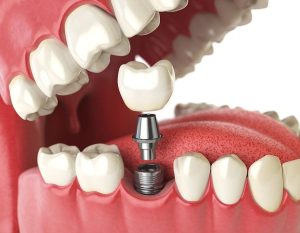Failing Dental Implant? Our Long Island Periodontist Can Help
Dental implants are an excellent solution for replacing missing teeth, offering durability, functionality, and a natural appearance. However, like any medical procedure, dental implants aren’t entirely immune to complications. If you’re experiencing discomfort or issues with your dental implants, you may wonder if they’re failing.
At the Farber Center for Periodontics and Dental Implants, Dr. Farber and his team are here to help you understand the signs of implant failure and provide effective solutions to save your smile.
If you think you’re dealing with dental implant failure, contact our Long Island periodontists. For our Medford dental office, call 631-758-3700 and for our Hauppauge dental office, call 631-265-4442.

What Is Dental Implant Failure?
Dental implant failure occurs when the implant doesn’t properly integrate with the jawbone or when complications arise after successful integration. While most dental implants have a success rate of over 95%, failures can happen due to various reasons, including improper care, medical conditions, or surgical complications.
Why Choose Dr. Farber for Failing Dental Implants?
At the Farber Center, we specialize in preserving and restoring smiles. Dr. Farber brings decades of experience as a leading periodontist in Long Island, ensuring the highest standard of care for our patients. Our state-of-the-art facility is equipped with the latest technology to diagnose and treat dental implant issues effectively.
We pride ourselves on providing a patient-centered approach and taking the time to understand your unique needs and concerns. Whether you’re experiencing complications with an existing implant or considering dental implants for the first time, we’re here to help. Implant dentistry is our specialty and we’re here to help.
See what our patients are saying from our testimonials:
“Dr Farber was professional, informative he really took the time to explain everything to me. He developed the right treatment plan that would be best for me!! He was caring and made me feel that my best interests was his goal!!” Carol Drago.
Early Signs of a Failing Dental Implant
Persistent Pain or Discomfort
While minor discomfort is normal after your dental implant procedure, ongoing or worsening pain may indicate a problem. Persistent pain could result from infection, implant movement, or nerve damage.
Gum Inflammation and Recession
Red, swollen, or receding gums around the implant site may signal peri-implantitis—a form of gum disease affecting implants. Left untreated, peri-implantitis can lead to bone loss and implant failure.
Implant Mobility
Dental implants should feel as secure as natural teeth. If your implant feels loose or moves when you bite or chew, it could indicate insufficient bone integration or bone loss.
Difficulty Chewing or Speaking
Changes in your ability to chew or speak comfortably may suggest underlying issues with the dental implant.
Unusual Bleeding or Discharge
Bleeding, pus, or discharge around the dental implant placement site may be signs of an infection requiring immediate attention.
Causes of Dental Implant Failure
Common causes of a failing implant often include:
- Poor Oral Hygiene: Inadequate brushing and flossing can lead to plaque buildup, gum disease, and infections that compromise the implant’s stability.
- Insufficient Jawbone Density: Successful implants require a strong, healthy jawbone for support. Insufficient bone density can lead to implant instability and failure.
- Smoking: Tobacco use restricts blood flow and hinders the healing process, increasing the risk of implant failure.
- Medical Conditions: Chronic illnesses like diabetes, osteoporosis, or autoimmune diseases can affect bone healing and the implant’s success.
- Surgical Errors: Errors during the implant placement process, such as improper alignment or placement, can lead to complications down the road.
- Bruxism (Teeth Grinding): Chronic teeth grinding or clenching exerts excessive pressure on implants, potentially causing them to fail.
If you need help with a failing dental implant, contact our Long Island periodontists today. We’ve helped countless patients save their teeth.

Diagnosing Implant Failure
At the Farber Center for Periodontics and Dental Implants, our implant dentists use advanced diagnostic tools and techniques to assess the health of your dental implants. During your visit, Dr. Farber will:
- Conduct a thorough oral examination.
- Take X-rays or 3D scans to evaluate the implant and surrounding bone.
- Identify any signs of infection, bone loss, or improper placement.
Treatment Options for Failing Dental Implants
Treating Infections
In cases of peri-implantitis or other infections, Dr. Farber may recommend deep cleaning procedures, antibiotics, or laser therapy to remove bacteria and promote healing.
Bone Grafting
For patients experiencing bone loss, bone grafting can restore the jaw’s strength and stability, creating a solid foundation for the dental implant.
Implant Removal and Replacement
If the failing implant can’t be saved, Dr. Farber will carefully remove it, treat the affected area, and place a new implant once healing is complete.
Addressing Underlying Conditions
Managing underlying health issues, such as diabetes or bruxism, can significantly improve the success of your implant treatment.
Prevent Dental Implant Failure
Prevention is the key to maintaining healthy dental implants. Follow these tips to ensure the longevity of your implants:
- Maintain Excellent Oral Hygiene: Brush twice a day, floss daily, and use an antimicrobial mouthwash to keep your gums and implants healthy.
- Schedule Regular Check-Ups: Visit the Farber Center regularly for professional cleanings and implant evaluations to catch any potential issues early.
- Quit Smoking: Avoiding tobacco products improves healing and reduces the risk of complications.
- Protect Against Bruxism: If you grind your teeth, consider using a custom nightguard to protect your implants.
- Follow Post-Surgery Instructions: After implant surgery, follow your periodontist’s instructions carefully to ensure proper healing and integration.

Save Your Smile Today with Our Periodontists in Long Island!
If you’re worried about the health of your dental implants, don’t wait for the problem to worsen. Schedule a consultation with Dr. Farber at the Farber Center for Periodontics and Dental Implants today. Our team is dedicated to helping you maintain a healthy, beautiful smile for life.
To visit our Long Island periodontists, contact our Medford dental office at 631-758-3700 and for our Hauppauge dental office, call 631-265-4442. Let’s get your oral health back on track!
Comments are closed.
